| Verdi, Giuseppe (1813-1901) | Giovanna d'Arco (Joan of Arc) | Libretto by Temistocle Solera |
| Teatro Regio di Parma | ||
| Michele Gamba | Conductor | |
| Emma Dante | Director | |
| Carmine Maringola | Set Designer | |
| Vanessa Sannino | Costume Designer | |
| Luigi Biondi | Lighting Designer | |
| Filarmonica Arturo Toscanini | ||
| Coro del Teatro Regio di Parma | ||
| Martino Faggiani | Choirmaster / chorus director | |
| Manuela Lo Sicco | Choreography | |
| Luciano Ganci | Tenor | Carlo VII |
| Ariunbaatar Ganbaatar | Baritone | Giacomo |
| Nino Machaidze | Soprano | Giovanna |
| Krzysztof Bączyk | Bass | Talbot |
| Francesco Congiu | Tenor | Delil |
France 1429. Giovanna appears as a prophetic figure while the French are in the throes of the 100 Years War against the English. After a dream, Carlo is inspired to seek a sanctuary near Rouen where he meets Giovanna, who predicts the end of France’s suffering. Her father, Giacomo, believing she is possessed, attempts to turn her over to the English. After her capture, Giacomo realises his mistake and frees her. Giovanna leads the French to victory but pays the ultimate price.
Giovanna d’Arco, which premiered at La Scala in 1845, was an instant popular success. It is said that within a few weeks of the premiere the favourite melodies from Giovanna were being ground out on the barrel organs on the streets of Milan. It is likely that Verdi delightful choruses from the opera were among them. Teatro Regio di Parma has entrusted their new production to Emma Dante, known for finding contemporary resonances in the historical works she stages. So, can we expect Giovanna was a feminist icon? Dante is certainly interested in what Giovanna symbolises but at the heart of her production is conviction that, as she says in the interview below, ‘music teaches us to find our souls.’
Recorded on 24.01.2025


